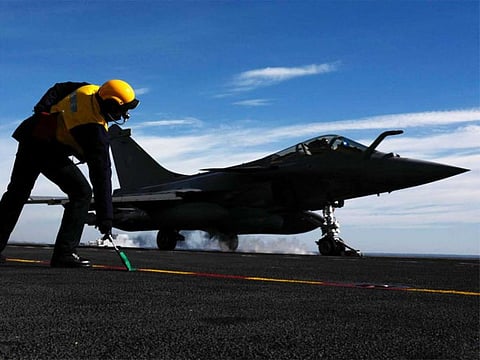The Rafale row rumbles on in India
Crony capitalism has flourished in India, and Anil Ambani is merely its latest ambassador

The latest twist in the Indian government’s proposed acquisition of 36 Rafale fighter jets from French firm Dassault is more semantic than financial or technical. The negotiations were begun in the Congress-led regime, in 2012, when Dr Manmohan Singh was the prime minister.
There are three points about the $8.7 billion (Dh31.95 billion) deal which are made out to be objectionable. One is that the price of the individual planes shot up from Rs526 crore [Rs5.26 billion or] to Rs1,670 crore [Rs16.7 billion]. But as the former defence minister — now Goa chief minister — Manohar Parrikar said, the first price was a non-starter; Dassault was not interested because they found the quoted price too low. The question is: what might have been a more optimal price than the one the Indian defence ministry and Dassult finally hit upon in the fullness of the inflationary years? In short, how did they arrive at Rs1,670 crore as the price of one jet. That process is missing from the controversy, which is now threatening to be potentially explosive as the general elections approach.
It is likely that on Wednesday the Comptroller and Auditor General (CAG) of India will table in parliament its audit report of the major defence contracts including the Rafale deal. It is unlikely there will be any shattering revelations. In any case, the Modi government could on its own lay bare the method by which the parties arrived at this price, unless it is a state secret. If it is, then the real issue is what constitutes state secrets. And the debate might come across as more illuminating because it defines Parliament’s remit once and for all.
The second point is the involvement of Anil Ambani, the chairman of Reliance group, and the brother of Mukesh Ambani. Anil Ambani was present when Modi went to France in 2015 to negotiate — among other things — the Dassault deal. The objection to the businessman’s presence allegedly translated into a preferential treatment whose corporate manifestation was a joint venture company partnered by both Reliance and Dassault.
The formation of the new company meant the new entity would channelise nearly 50 per cent of the money transacted from the Rafale deal amounting — by one estimate — to nearly Rs30,000 crore [Rs300 billion]. This would be done through an ‘offset’ clause which in this case means Dassault is obligated to spend the money in value and worth in Indian army-managed R&D [research and development, and related private companies. Anil Ambani has said in this regard that other companies besides his will benefit from the offset clause.
The moot point though is whether the Modi government recommended Anil Ambani’s name as the primary beneficiary. The opposition and the media — suddenly in the truth-to-power mode in the wake of the Rahul Gandhi-led Congress winning the recent state assembly elections in Rajasthan, Madhya Pradesh, and Chhattisgarh — allege that he has been favoured. The point, however, is that anyone risks being called a ‘crony capitalist’ in this contest if, instead of Anil Ambani, someone else had been officially recommended.
What might have done the larger good would be the demand for and detailing of the process by which private offset beneficiaries were finalised. Because, that benefit must go to someone. That the offset clause is good for India can’t be reasonably doubted, and since the Modi government appears to have introduced it to the contract, that credit must accrue them.
The last — and the latest — chapter of the saga is based on a report in The Hindu last week which said that Parrikar wrote a note that said direct negotiations by the Prime Ministers’ Office (PMO) with Dassault may weaken the defence ministry officials’ bargaining position. He later wrote in clarification: “It appears PMO and French President’s office are monitoring the progress of the issue which was an outcome of the summit meeting. Para 5 (of the note) appears to be an over reaction. Defence secretary (G. Mohan Kumar) may resolve the matter in consultation with principal secretary to PM.”
Defending their story, The Hindu said: “What is para 5? In para-5, the official suggests that the MoD ask the PMO to lay off the negotiations, or the MoD be relieved of that duty. This, Mr. Parrikar found, to be ‘over-reaction.’ He did not note any concerns with paragraph four, for instance, which said: “The discussions between Diplomatic Adviser to the French Defence Minister and Joint Secretary to PM tantamount to parallel negotiation.”
But it is also clear from the notes that there was a prime minister-president channel of talks existing. If so, why should the PMO not hold ‘parallel discussions’? Nor is it clear from the versions antagonistic to the government narrative, why or how the defence ministry’s chips would be greatly lowered if the PMO is lawfully part of the negotiations — provided the takeaway is transparent to all. If not, the semantic distinctions like ‘parallel’ or ‘over reactions’ do not mean much any way.
What really queers the pitch for the Modi government is the presence of Anil Ambani, whom Rahul Gandhi specifically and the opposition generally sees as an anointed ambassador of crony capitalism. The Ambanis and the Adanis are visibly close to Modi. The Tatas, the Birlas and Dalmias were equally close the Nehru-Gandhi family. Crony capitalism has flourished in India.
A few influential business families always benefit from their proximity to the powerful politicians of the moment. But, is the opposition looking for a structural change in the Indian economy rather than personally attacking the PM? For instance, the elimination of the middle men, cronies and rent seekers?
If so, they have a great metaphysical problem on their hands: how to fix the fix without fixers.
C.P. Surendran is a senior journalist based in India.



